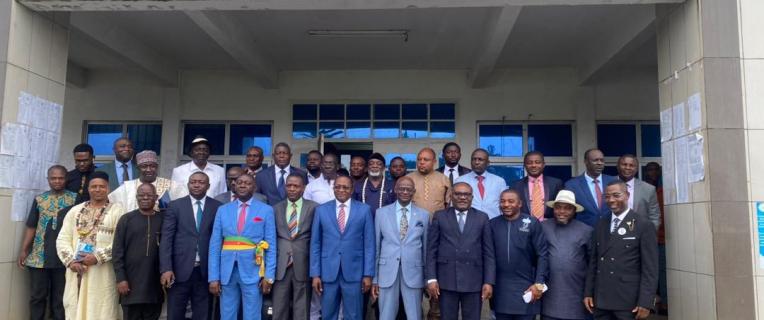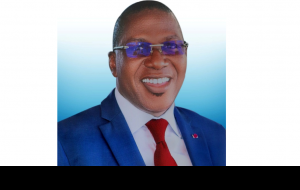Regional Workshop RLA-MOH in Buea Streaming the Appropriation of Regionalized Competences for Improved Management of the Health System

The South-West region is taking a decisive step in decentralization with the involvement of local authorities in the management of health services. On October 3, 2024, a workshop was held in Buea under the auspices of Governor Bernard Okola to discuss the role of mayors in managing health facilities, thereby reflecting the growing responsibility of councils in providing local health services.
This event brought together key stakeholders in the health sector and local authorities with the aim of reinforcing the appropriation of competences transferred by the State. This initiative is crucial for local autonomy and the improvement of public services in the South-West region.
In his opening speech, Governor Bernard Okola addressed the challenges encountered in the implementation of decentralization. He stated, “This workshop is an opportunity to better understand the responsibilities of Regional and Local Authorities (RLA) and to overcome the obstacles in order to fully implement this transfer. Our ambition is to ensure quality health services through effective management of available resources.”
This speech set the tone for the meeting, which was marked by two major presentations. Dr. Ebongo, Director of Family Health, emphasized the importance of supervising health infrastructure and promoting primary health care within the communities. He also addressed the difficulties related to integrating health services in rural areas, highlighting the need for close collaboration with the Ministry of Public Health for better resource optimization.
In a second presentation, Mr. Melo Adamou clarified the legal and regulatory aspects related to the transferred competences, providing participants with a comprehensive understanding of the legal framework of decentralization. He also encouraged RLAs to strictly adhere to existing regulations to avoid any conflicts of competence among the various stakeholders.
The discussions that followed these presentations allowed participants to raise several concerns. For example, some mayors expressed difficulties in collaborating with health district heads, who were sometimes accused of not submitting concrete projects or fully engaging in the management of health personnel. The Lord Mayor of Buea, Mafany Namanga, notably highlighted the urgent need to enhance coordination between RLAs and health districts for effective management of human and material resources. Other local elected officials reminded the assembly of the necessity for better planning of health infrastructure to prevent duplication of efforts or resource dispersion.
The workshop was characterized by in-depth discussions and reflective sessions addressing the numerous challenges faced by councils in managing health institutions. Governor Bernard Okola shared the workshop’s conclusions and made several key recommendations:
1. The establishment of a formal procedure to include technical officers in the development of council health projects, thereby improving project efficiency;
2. Mayors and the regional delegate were urged to strictly adhere to the rules, fulfil their duties diligently, and avoid interfering in the competences of others;
3. Improved coordination between RLAs and local health services is essential to ensure smooth management of health structures, notably through mixed monitoring committees.
In his closing remarks, the Governor thanked the participants for their commitment and contributions. He reaffirmed his commitment to enhance the regional health system while calling for strengthened support from the central Government. “We will continue to advocate for more human resources and infrastructure to support the reconstruction and development of the South-West region,” he stated. He also urged mayors to ensure optimal management of health centres within their municipalities, underscoring the importance of strong local leadership in advancing the decentralization agenda.
The workshop served as a platform to discuss the inconsistencies and challenges faced by regional and local authorities in managing health services within the framework of decentralization. With local councils and the regional assembly now at the forefront, and under the supervision of the Ministry of Public Health, the region is on track to build a more responsive and community-centred health system.
As decentralization progresses, the active participation of councils, supported by state authorities, will be crucial in transforming the health sector and ensuring better service delivery for all. The recommendations from this workshop will undoubtedly guide the next phase of the process, ensuring that health services in the South-West region are both effective and equitable.
The resource transfer monitoring teams will begin data collection in the various RLAs of this region starting tomorrow.
Audrey Orock/Celcom/MOH
Le Minsante

la santé, un avenir prometteur.
la vision de développement à long terme du Gouvernement est l’accession du Cameroun au stade de pays émergent aussi bien du point de vue économique qu’industriel à l’horizon 2035. Dans cette perspective, le rôle du secteur de la santé est fondamental dans la mesure où il ne saurait y avoir de développement sans une bonne santé des populations.
Notes d'information / Communiqués
- LISTE DES FORMATIONS SANITAIRES DE CATEGORIE D SANS AUCUN DOCUMENT ADMINISTRATIF REPERTORIE
- Press release/many health centres and clinics operating illegally throughout the country have been identified
- Communiqué de presse du MINSANTE / centres de sante et cabinets de soins exerçant en situation irrégulière sur le territoire national
- Internal Call for Applications HeSP Project
- Avis d’appel à candidature interne Projet HeSP
- National Strategic Plan for Reproductive, Maternal, Newborn, Child and Adolescent Health and Nutrition (NSP/RMNCAH-NUT) 2024-2030
- Plan Stratégique de la Santé de la Reproduction Maternelle, Néonatale, Infanto-Juvénile, de l’Adolescent et de la Nutrition (PSN-SRMNIA-NUT 2024-2026)
- FAQ Mpox.pdf

























